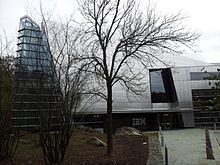International Business Machines Corporation (using the trademark IBM), nicknamed Big Blue,[6] is an American multinational technology company headquartered in Armonk, New York and present in over 175 countries.[7][8] It is a publicly traded company and one of the 30 companies in the Dow Jones Industrial Average.[a][9][10] IBM is the largest industrial research organization in the world, with 19 research facilities across a dozen countries, having held the record for most annual U.S. patents generated by a business for 29 consecutive years from 1993 to 2021.
IBM was founded in 1911 as the Computing-Tabulating-Recording Company (CTR), a holding company of manufacturers of record-keeping and measuring systems. It was renamed "International Business Machines" in 1924 and soon became the leading manufacturer of punch-card tabulating systems. During the 1960s and 1970s, the IBM mainframe, exemplified by the System/360, was the world's dominant computing platform, with the company producing 80 percent of computers in the U.S. and 70 percent of computers worldwide.[11]
IBM debuted in the microcomputer market in 1981 with the IBM Personal Computer, — its DOS software provided by Microsoft, — which became the basis for the majority of personal computers to the present day.[12] The company later also found success in the portable space with the ThinkPad. Since the 1990s, IBM has concentrated on computer services, software, supercomputers, and scientific research; it sold its microcomputer division to Lenovo in 2005. IBM continues to develop mainframes, and its supercomputers have consistently ranked among the most powerful in the world in the 21st century.
As one of the world's oldest and largest technology companies, IBM has been responsible for several technological innovations, including the automated teller machine (ATM), dynamic random-access memory (DRAM), the floppy disk, the hard disk drive, the magnetic stripe card, the relational database, the SQL programming language, and the UPC barcode. The company has made inroads in advanced computer chips, quantum computing, artificial intelligence, and data infrastructure.[13][14][15] IBM employees and alumni have won various recognitions for their scientific research and inventions, including six Nobel Prizes and six Turing Awards.[16]
- ^ "Certificate of Incorporation of Computing-Tabulating-Recording-Co", Appendix to Hearings Before the Committee on Patents, House of Representatives, Seventy-Fourth Congress, on H. R. 4523, Part III, United States Government Printing Office, 1935 [Incorporation paperwork filed June 16, 1911], archived from the original on August 3, 2020, retrieved July 18, 2019
- ^ "IBM Is Blowing Up Its Annual Performance Review". Fortune. February 1, 2016. Archived from the original on October 29, 2020. Retrieved July 22, 2016.
- ^ "IBM – Arvind Krishna – Chief Executive Officer". www.ibm.com. Archived from the original on March 8, 2022. Retrieved March 8, 2022.
- ^ "IBM Newsroom - Gary Cohn". IBM Newsroom. Retrieved March 8, 2022.
- ^ "US SEC: Form 10-K IBM". U.S. Securities and Exchange Commission. February 26, 2024.
- ^ "IBM100 - The Making of International Business Machines". www-03.ibm.com. March 7, 2012. Archived from the original on October 5, 2018. Retrieved December 30, 2022.
- ^ "Trust and responsibility. Earned and practiced daily". IBM Impact. June 27, 2019. Retrieved December 30, 2022.
- ^ "10-K". 10-K. Archived from the original on December 5, 2019. Retrieved June 1, 2019.
- ^ "Dow Jones Industrial Average". SlickCharts. Retrieved October 3, 2024.
- ^ "IBM Overview". Yahoo! Finance. Retrieved October 3, 2024.
- ^ "IBM | Founding, History, & Products | Britannica". www.britannica.com. Retrieved December 30, 2022.
- ^ Alfred, Randy. "Aug. 12, 1981: IBM Gets Personal With 5150 PC". Wired. ISSN 1059-1028. Retrieved November 19, 2024.
- ^ Helmore, Edward (December 4, 2023). "IBM unveils new quantum computing chip to 'explore new frontiers of science'". The Guardian. ISSN 0261-3077. Retrieved February 14, 2024.
- ^ Carter, Sandy. "The Evolution Of AI: From IBM And AWS To OpenAI and Anthropic". Forbes. Retrieved February 14, 2024.
- ^ McDowell, Steve. "IBM Realigns Its Storage Business To Match Data-Driven Enterprise Needs". Forbes. Retrieved February 14, 2024.
- ^ "About us". IBM Research. February 9, 2021. Retrieved December 30, 2022.
Cite error: There are <ref group=lower-alpha> tags or {{efn}} templates on this page, but the references will not show without a {{reflist|group=lower-alpha}} template or {{notelist}} template (see the help page).

